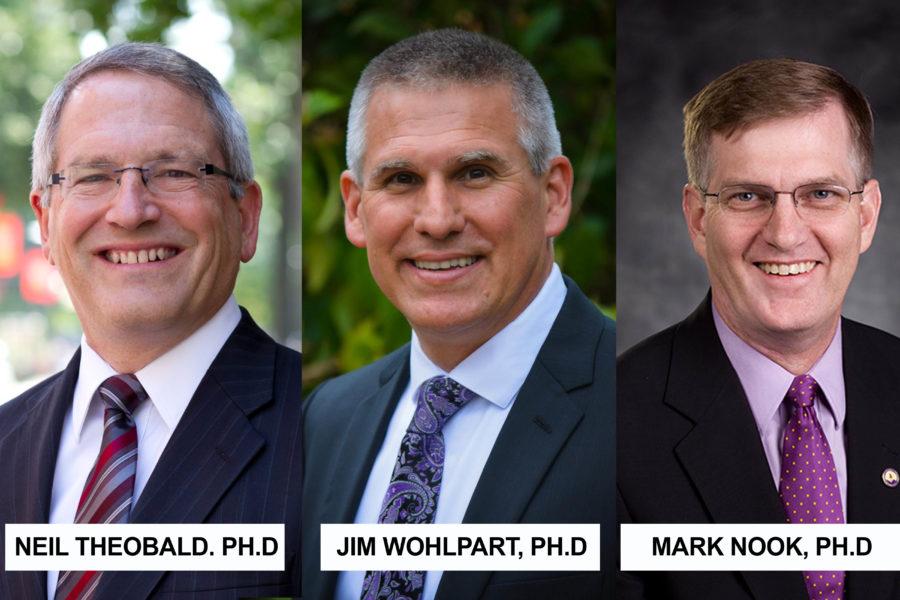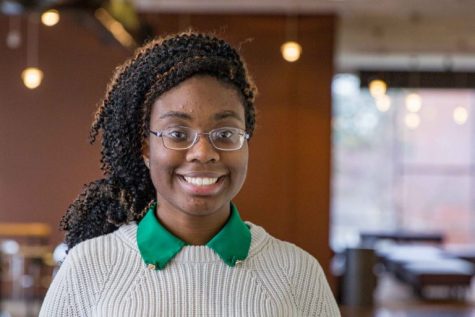UPDATE Pres. candidates complete forums
Dec 1, 2016
The three final candidates in the UNI presidential search have been announced, with the last listening session to occur today at 2:30 p.m. in the Maucker Union Old Ballroom.
The last candidate was announced Wednesday morning, making the final list in announcement order: Neil D. Theobald, A. James Wohlpart and Mark A. Nook.
There was originally supposed to be four finalist but one dropped out of the running. Daniel Power, co-chair of the presidential search committee, said that this finalist cited “personal reasons” and “timing” as to why they decided to drop out of the race.
Theobald
Neil Theobald is the former president of Temple University, which has nearly 40,000 enrolled students. He also served as Chief Financial Officer at Indiana University, where he formerly taught.
He gave his presentation titled “Challenges and Future Directions of Public Comprehensive Universities such as UNI” on Tuesday at 2:30 p.m. which was followed by an open forum Q&A session.
His presented his five core principles which ranged from “Creative and intellectually rigorous faculty are a university’s most important resource,” “Shared governance is essential to a university’s success” and “All university planning must start with mission first.”
According to “Inside Higher Ed,” the New York Times and Philadelphia outlets, Theobald’s four years as president at Temple came to a controversial end in July.
Temple’s board of trustees had voted no confidence in Theobald following a budget overrun of $22 million and his unexpected dismissal of the university’s provost, according to “Inside Higher Ed.”
The overrun was reportedly linked to overallocation of merit scholarships.
The board was considering firing Theobald, and he ultimately resigned.
Towards the end of Theobald’s presentation he took the time to address the controversy surrounding his leaving the position of president of Temple University. Theobald said over the summer he was instructed to make a hire without faculty input, but instead “chose not to break the covenant of shared governance.”
“The consequence of standing for that principle is I had to leave, and I am fine with that,” said Theobald. “We can pursue that matter further in the open forum if you choose to.”
Theobald said much reporting about the controversy has been inaccurate, and those stories have been “recycled in some Iowa newspapers the last day or two.”
The Waterloo-Cedar Falls Courier, The Des Moines Register and other publications have cited reports of the cost overrun and Theobald’s subsequent resignation.
There were some people who were surprised that no one brought the matter up again during the 35 minute questioning session, one of whom was Sarah Eastman, an advocate for UNIFY for Education and co-chair of the Panther PAC.
“He brought it up ahead of time got ahead of that and did state at that time that he would be willing to go into more detail about it if anyone wanted to ask during the open questions,” said Eastman. “I was kind of surprised that no one asked him about it to go into more detail and maybe somebody was planning on it before we ran out of time.”
“I’d be interested in learning some more,” said Eastman on the controversy. “I think it’s always complicated when there’s a governing board and we’ve certainly seen that here as well where we have a board that is appointed by our governor.
“And I think the example here where we were we lost president Ruud and we really don’t know for certain why that was but it’s potentially conflicts with the governing board is maybe similar to the situation that happened there,” Eastman said.
Throughout Theobald’s presentation he used examples of initiatives he implemented during his time at Temple University to boost the amount of diverse students being admitted and to increase the overall graduation rate of students.
Theobald ended his presentation stating, “I’m deeply devoted to public education and their research and teaching missions.”
Wohlpart
Jim Wohlpart, UNI’s current interim president and former provost, gave his presentation Wednesday at 2:30 p.m. titled “Thriving into the Future.” Throughout his presentation, he spoke candidly to the audience, joking and often asking them questions about what he said earlier in the presentation.
Wohlpart’s presentation went over the “challenges and directions for public comprehensive universities,” touching on access, affordability, accountability, the national narrative, vision, leadership and community.
Rikke Adolfsen, junior psychology, attended Wohlpart’s presentation but won’t be able to attend the others.
“I thought he made a lot of good points that I, as an international student, value,” Adolfsen said. “I learned a little bit about the out-of-state tuition how they managed the out-of-state tuition increase compared to the in-state tuition increase and I thought that was interesting as something that I didn’t really know.”
Wohlpart also used his experiences from his time at the Florida Gulf Coast University as dean and his most recent work being in both the provost and interim president role.
“The central question that I have always asked in all of my leadership roles and what I ask every day when I come to this institution is are other’s flourishing as a result of my work,” Wohlpart said. “But we know that ultimately great work does not come from one individual. A president can’t get us there; it comes from a community that is inspired and engaged that is interested first and foremost in learning.”
Nook
Mark A. Nook is currently the Chancellor at Montana State University Billings (MSUB) in Billings, Montana. Nook holds his Ph.D. in Astronomy, and obtained his M.S. degree in Astrophysics from Iowa State University.
MSUB is similar to UNI in that it emphasizes teacher preparation and focuses on liberal arts, according to Nook’s curriculum vitae. MSUB’s enrollment is around 4,400 students.
Nook’s presentation, which was entitled “The Challenges and the Future of Public Comprehensive Universities,” took place at 2:30 on Friday, Dec. 2. An open forum Q&A session followed the presentation.
Nook opened the presentation by focusing on three challenges/opportunities facing public comprehensive universities. These were: “Questioning Higher Education Value,” “Questioning the Liberal Arts” and “Challenging Tenure.”
“We oftentimes look at the challenges that are facing us and fail to see them as opportunities,” Nook said. “I think it’s really important that we realize that those challenges really are the things that we need to grasp, hold on and take care of.”
Nook also touched upon the importance of diversity and inclusivity on campus, as well as high student engagement.
Towards the end of the presentation, Nook praised UNI’s recently released Strategic Plan and stressed that the university should treat the plan as a “living document.”
“One of the things that’s really great about that document is it has metrics – there are things that you can measure,” Nook said. “And I would suggest and make sure that you develop a website where those metrics are tracked continually.”
All information about the candidates and live streams can be found at the official website https://uni.edu/presidential-search/
















andrea hill • Dec 5, 2016 at 2:14 pm
Neil Theobald is a liar.